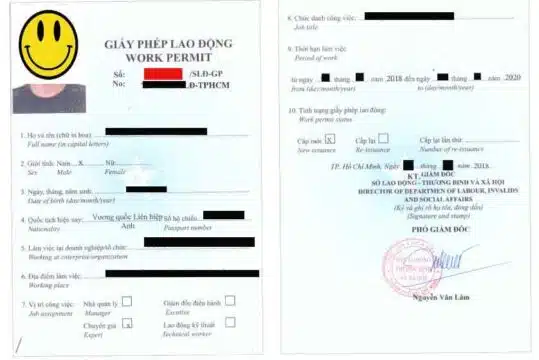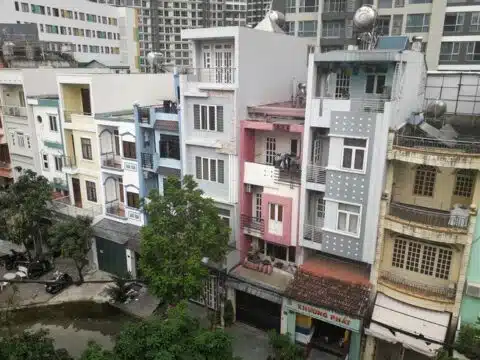Having personally moved to Vietnam a handful of years ago, I decided to build this whole website in order to share tips with others. Moving to Vietnam, or any new country for that matter, is an enormous life change. With this guide, I hope to help others to make this transformation as smooth as possible.
There are many compelling reasons to move to Vietnam. Assuming you’ve already been convinced, it’s time to start planning the actual steps. Also read our list of interest Vietnam facts to learn more about the country before you come!
You’ll also want to make sure you’re up-to-date with the latest entry requirements for Vietnam before you book that flight.
Why Are You Moving to Vietnam?

The answer to this question is going to determine the steps you need to take to move forward with a successful move to Vietnam. Is it to start a new life, to retire, to improve your career, to change careers, to live in country with a lower cost of living, or simply to give it a try?
Once you identify your reasons for moving, you can move on to relevant questions, such as what job opportunities are available, what visa you’ll need, just how low the cost of living is, what the general lifestyle is like, and so on.
Types of Work for Expats in Vietnam
Expats work in various industries in Vietnam, including education, tourism, banking, IT, and more. However, more often than not, being unable to speak the local language, Vietnamese, is going to make it more difficult for you to access most jobs. If you already work for an international company abroad, it is wise to investigate whether an internal transfer is possible.
While teaching English is probably the most common option, many expats start or run a business of their own once they are already living in Vietnam. Some examples might include teaching yoga, blogging, photography or other creative endeavours, running a restaurant or bar, and more. The sky is the limit!
If you fall into this category, I suggest you read our digital nomad guide to Vietnam.
If you’re planning to live but not work in Vietnam, it all boils down to how much money you have saved and how long it will last you, plus how long the visa you can get will last for.
Teaching jobs
Teaching English in Vietnam is an enticing option because you can teach English regardless of whether you have experience in the field or not. All you need is a university degree in any field. You will also need a TEFL certificate such as this online one. You can also easily earn enough to transfer money out of Vietnam to your home savings account.
There’s only one caveat (and it’s a big one). Most English schools in Vietnam are looking for Native English speakers, and especially Caucasian ones. The first requirement is fair enough – schools and parents want their children or themselves to learn from someone who is fluent in the language.

However, the second point boils down to ignorance at best, or even just plain racism. Many parents think that white people are “true” native speakers, and are skeptical of ones with darker skin. This is a problem not just in Vietnam but in many Asian countries, although it is slowly changing.
While there are surely exceptions, the main thing to note here is that if you are not from one of the countries that is considered to have English as the main language (i.e. UK, Ireland, USA, Canada, Australia, New Zealand, South Africa), or if you are from one of those countries but aren’t white, you may have more difficulty finding a job.
If you are a native English speaker but of Vietnamese descent, it’s a double-edged sword. To them, the fact that you “look” local might make them want to try to pay you less like a local teacher, but if you can speak some Vietnamese that might actually give you an advantage in terms of teaching.
Other jobs in Vietnam
The truth of the matter is that most expats working in Vietnam are English teachers. Unless you are planning to work online or start some kind of your own business, you shouldn’t come in with the hope of getting hired in some other industry, unless you already have some kinds of lead or local connection.
Which Visa To Get
The type of visa you can get for Vietnam is probably the single most important factor when decided whether to move to Vietnam.
There are a fairly limited number of visa types for expats, which I’ll describe below, or you can read about it more detail in our guide to Vietnam visa types. If you’re American, also see our US citizen Vietnam visa guide.
Here are the main visa types for Vietnam:
- Tourist visa (apply for one here!)
- Business Visa
- Work visa/permit
- Temporary residence permit
- Student visa
Tourist visa
Lots and lots of expats in Vietnam are living and working here on a tourist visa, or DL. And yes, that’s illegal. However, Vietnam doesn’t really have a lot of options to make this legal unless you are a qualified skilled worker or an English teacher.

Living on a tourist visa is very common here. Currently, some countries can even enter Vietnam visa free (see a full list of them here). Other have to apply for a tourist visa of up to 30 days. Current, most countries have to apply for an e-visa to enter, and the only option is 30 days.
Then, many people just do a visa run by leaving Vietnam, either by air or at a land border, and coming back in, and just keep doing this again and again. Here’s a detailed guide to doing Vietnam visa runs.
Read our guide on how to apply for Vietnam tourist visa.
Business visa
The business visa, also called DN visa, is a great option if you can get it, as it is valid for one year. A business visa is supposed to be for those entering Vietnam for business reasons will give you the legal rights to live, find a job, and work in Vietnam while you are waiting to process your work permit or temporary residence card.
Many travel agencies will tell you that they can get you a business visa, which is not true. Only a few nationalities can get a business visa, one of them is the US passport holders. They can get a hold of this precious visa that is valid for one year.
Student visa
This is an easy visa to get, however, there is a lot of paperwork you will need to process, not to mention that you actually have to be a student to be granted of this visa. The good side is, if you are, you’ll be legally living in Vietnam.
Retirement visa
I’m sorry to bear the bad news but Vietnam doesn’t have a retirement visa at the moment. Many retired expats here are living and using a tourist visa or business visa. Many others possess a spousal visa (i.e. they are married to a Vietnamese person).
Work Permit and Temporary Residence Card

After entering Vietnam with your visa, you’ll need to get a work permit and temporary residence card. To get these, you will need to provide a whole bunch of paperwork. We recommend preparing all of this before you leave your home country.
For example, most of your educational certificates or diplomas, criminal record, etc. are required to be notarized from your home country or from a specific government agency. See this guide for all the specific documents that are needed.
Budget for moving to Vietnam
One of the most important considerations when deciding whether to move to Vietnam is the cost of moving to and living in the country. Once you know this, you can plan how much of a budget you will need to get set up there, and to live until you get your first pay check.
When making your moving budget, make sure to include the cost of flights, visa, and excess baggage if you are planning to bring any. Then, add a one-to-two-month apartment deposit (budget $1000 to be safe) and living costs for 1-2 months to cover the time up to your first paycheck.
For more details on exactly how much to bring, read our recommended budget for moving to Vietnam. We’ve also got this handy checklist for what to pack when you move.
Cost Of Living

In regard to the cost of living in Vietnam, Vietnam is one of the most affordable places for expats to live.
In my personal experience, housing is especially cheap. You can find apartments for $250 per month. If you have a higher budget, you can get much nicer accommodation in a more upscale part of the city for $1000 a month. What’s more, most of the apartments here come fully furnished.
Groceries and food are cheap, too, but not quite as cheap as some other Southeast Asian countries. If I’m living on a tight budget, I can spend as low as $20 for a week worth of groceries, or a little more if I’m eating out but sticking to local Vietnamese snacks and meals.
But you can also go to grocery stores that carry international brands or eat in fancier restaurants, which will obviously cost more.
Other expenses like mobile data and transportation are also relatively cheap, while electric bills are also cheaper than in Western countries. You can even find apartment deals where the bills are all included.
As you can imagine, living in smaller towns will be cheaper than living in big cities like Hanoi or Ho Chi Minh City (see our Ho Chi Minh guide and cost of living in Ho Chi Minh City). For me, I’ve lived in both of these cities, and living expenses seemed pretty much the same. However, some people say that Hanoi is on average about 10% cheaper than Ho Chi Minh.
Now, I live in Dalat, a small mountain town in southern Vietnam. Here, the cost of living is significantly lower and since the town is smaller, I didn’t have to get a motorbike (another reduced cost), and I can simply walk to most places or easily hop on a motorbike taxi.
Overall, for a solo expat living on the lower budget side, you can spend just a little over $500 per month. However, if you are less frugal, you can easily spend 2, 3 or more times that amount.
Deciding Where To Live

Now it’s time for the best part (or at least my favourite part). Choosing a place to live in Vietnam can be lots of fun. When choosing a place to relocate to, there are many factors you may want to consider, such as:
- Availability – Do you need the shops and services of the big city, or can you get by minimally? For example, do you need gyms and modern clinics?
- Transportation – Is there an international airport or domestic airport or train stations that can take you outside of Vietnam or to the next big city? Do you prefer to drive or take public transport? Read more in our Vietnam transportation guide and guide to driving in Vietnam.
- Comfort – Is housing/apartment choices that have comfortable set up (hot shower, well-built building, furnished, etc.)?
- Affordability – Does the cost of living in this city/town meet your budget?
- Job availability – If you need to find work, this is something that has to be on top of your list when choosing a place to live.
- Expat community – Knowing if the city/town you’re moving to has a large expat community is a great way to measure if you’ll find it easy to build new relationships and friendships.
- Weather and pollution – I’ve lived both in Hanoi and Ho Chi Minh and both places have horrible air pollution. Also, the weather varies considerably from north to south. For more info, read about the different seasons of Hanoi.
- Attractions: Which cities have the best temples in Vietnam? The most historic sights? Do you care about malls and museums?
To help you answer the above questions, read or guide to the best city to live in Vietnam!
Accommodation in Vietnam
When choosing a place to live and you are moving by yourself, you don’t need to find an apartment right away. It’s quite cheap to stay in a hotel or guesthouse while you are apartment hunting. However, if you are moving with your family, you can consider renting a villa or an entire house for a month while looking for a suitable place to rent or live.
Some people, especially those who have furniture to move or a big family to bring, prefer to find a new place before arriving. If you go on this direction, I strongly recommend you either fly to Vietnam before the big move and start looking for a place, or don’t sign for an apartment or house rental for longer than six months, just in case you don’t like it.
In case you don’t like the place you found, at least you’ll have a house while looking for a new one without losing your deposit or having to endure a place you don’t feel at home in. Many landlords are willing to offer a 6-months contract.
Many houses or apartments in Vietnam meet Western standards at first appearance. However, many hidden problems can arise, and you won’t know about them until you already moved in. Therefore, it’s not a bad idea to commit to a shorter time, especially when first moving there.
How to find an apartment in Vietnam

Finding an apartment in Vietnam is not very hard, as long as you know where you want to live, what living arrangement you are looking for, and your budget.
One of the best ways to find an apartment is through Facebook groups like these ones. There are also some local sites that you can use, but usually they are not well-translated into English, so they can be challenging to use.
What you need to remember is that expats come and go in Vietnam or move around the country quite often, so there are always new apartments opening up. It’s best to sign the apartment contract once you are here so you can be able to inspect the place first. This can help to avoid losing your deposit once you realize a place you’ve committed to has unforeseen issues.
For more information on this topic, read our guide to finding an apartment in Vietnam.
Best Time to Move to Vietnam

You probably never thought to look up the best time to move to a new city or even country, but in Vietnam, this can affect your accommodation hunting or even job opportunities.
I moved to Ho Chi Minh the first time around August, which was a pretty good time to move. At this time, the school year had just started (yes, in Vietnam it starts in August), so if you are planning to move a few months before that, it’s the perfect time to find English teaching jobs. On the other hand, because more people come at that time, it can be a little harder to find an apartment.
I then moved to Dalat at the beginning of December, which I think is the worst time to move to Vietnam. December is high season for the tourism industry, which means many more travelers are there.
In a city like Dalat, which attracts both locals and foreigners at this time of the year, many apartment owners would rather rent their apartment on a day-to-day basis instead of for long-term rentals. They may charge a minimum of $20 a day and even up to $80. This meant it took me longer to find a reasonably priced place to live there.
After December comes the biggest festival and public holiday of the year in Vietnam, called TET or Vietnamese New Year. The holiday lasts for over a week. Again, apartment owners would rather rent out their rooms daily day-to-day instead of monthly around this time. Moreover, getting around the country can be more difficult and some businesses will be closed. Therefore it’s best to avoid coming at this time.
In terms of weather, winter is dry in Vietnam, hence the tourists come. Spring gets very hot, and the rains come in summer. In early fall, sometimes typhoons strike the coast and cause damage. Overall, the south of Vietnam is hotter year round and more tropical, while the north can be cool and damp in winter.
For the above reasons, I think spring and early summer and the best times to move to Vietnam. June and July are perfect for looking for English teaching jobs, plus you can score some apartment deals as many current teachers leave the country for summer holidays to go traveling or go home to visit their families.
Packing
If you’re coming to Vietnam solo, perhaps to teach, consider brining as little as possible to make your move easier.
Some essential items that may be hard to find include the right clothing – especially if you’re taller or larger than average (see our guide to what to wear in Vietnam), deodorant (hard to find), medications, electric adapters if needed, and of course all your necessary documents. Everything else can be purchased there, especially in the big cities.
For more suggestions about what to pack, see our packing list for moving to Vietnam.
Bringing a pet? We’ve also got you covered!
Moving Companies

If you have large things to move from your current home to Vietnam, finding a moving company would be ideal to avoid all the hassle. This company can walk you through bringing your furniture and even car. They can also assist you with the legalities of the process.
International Schools for Kids
For people who are moving with their children, you may want to start looking at international schools in the city that you’ve chosen to live in. It’s possible that you even chose what city to move to based on which one had the best school for you kids.
There are many international schools in Vietnam, mainly in big cities like Hanoi, Ho Chi Minh, and Da Nang. Looking up these schools will help you prepare which documents to bring with you and what to expect from the school system. This will also help you prepare for how much they might cost.
Once you’ve made a final list of schools you want to check out, visit them with your kids once you arrive before signing up for anything.
You should also remember that not all international schools that claim to be “certified” are actually certified. Make sure to do your research beforehand.
Here’s a list of international schools in Vietnam.
Expat Community
Vietnam has a large expat community. They are mostly in the big cities, but sometimes even in small towns. On top of that, there are loads of travelers backpacking around Vietnam and riding motorcycles to remote corners of the country at any given time.
The expat community is largely composed of English teachers, while there are also many foreigners who are married to a local and have started a business here. The age range is very wide, as there are also foreign families living in Vietnam. Therefore, it’s quite easy to network and connect with other expats and travelers in Vietnam.
Of course, you’ll also have the chance to make many local friends!
NOW READ: What to do once you’ve moved to Vietnam
Tips for Trip Success
Book Your Flight
Find an inexpensive flight by using Kayak, a favorite of ours because it regularly returns less expensive flight options from a variety of airlines.
Book Your Hotel or Special Accommodation
We are big fans of Booking.com. We like their review system and photos. If we want to see more reviews and additional booking options, we go to Expedia.
You Need Travel Insurance!
Good travel insurance means having total peace of mind. Travel insurance protects you when your medical insurance often will not and better than what you get from your credit card. It will provide comprehensive coverage should you need medical treatment or return to the United States, compensation for trip interruption, baggage loss, and other situations.Find the Perfect Insurance Plan for Your Trip

Victoria
Saturday 31st of October 2020
I'm looking for a visa agent in Vietnam